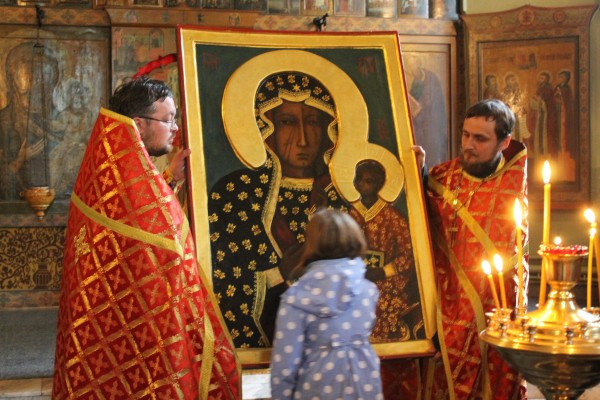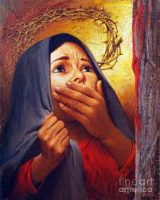Orthodox Christians pray not only to God, but also to the Mother of God and the saints. This practice of prayer in the Orthodox Church differs from, for example, the practice of Protestant communities. Protestants do not recognize prayer to the Mother of God and the saints. They say: we do not need intermediaries to approach God. This is a fair remark – we do not need “intermediaries” – but the conclusion drawn therefrom is wrong. After all, we don’t pray to the Mother of God as to a kind of middle tier between us and God; we pray to her because she is the Mother of God, because it is impossible to separate her from her Divine Son.
When I was studying in England, my professor – an elderly Orthodox bishop – often invited me for studies in his home. I would go to his house, and his elderly mother would open the door for me. Imagine if I didn’t greet her, if I didn’t notice her, but passed right by her into the house saying: “I don’t need any intermediaries; I only deal with the bishop.” It seemed to me perfectly natural that, dealing with the son, I also dealt with the mother. Of course, this argument is of a purely everyday character.
There are also more serious arguments. The most important of these is the experience of millions of people who show that the Mother of God listens to their prayers and replies to them; that she helps people; and, moreover, that she is indeed an intercessor for people before her Son and God.
The Mother of God is inseparable from the Savior; Her exploit [podvig] is inseparable from His. Consider that when the Angel of the Lord descended from heaven to say to her: thou shalt conceive in thy womb, and bring forth a Son (Luke 1:31), the Incarnation depended upon her agreement or disagreement. She could have said “no,” but she said “yes.” She raised the Child, brought Him to the Temple in sacrifice to God; She traversed His entire earthly life alongside Him. When Christ was crucified, she stood at the Cross, because she could not be separated from Him. She was with Him even in His most fearful suffering, because she became a participant in His exploit.
When the Lord was on the Cross, His beloved disciple stood next to Him, and He said to her: Woman, behold thy son! And to his disciple He said: Behold thy Mother (John 19: 26-27). He thereby, as it were, gave over not only to his beloved disciple, but to all His disciples, her protection and care. From that moment she, as the Mother of her Son, also became the Mother of His followers, that is, the Mother of the Church. And we turn to her as to our Mother and the Mother of the Church.
We say in prayer to the Mother of God: “Most Holy Theotokos, save us.” This doesn’t mean that we consider her to be our savior. The Savior is Christ. But we confess her involvement in the mystery of salvation, her participation in this mystery. And we understand that salvation is possible for us because the Mother of God expressed her agreement with the word of God addressed to her. And, thanks to her consent, we have access to her Son and her God, our Heavenly Father.
To be continued…
Translated from the Russian




















